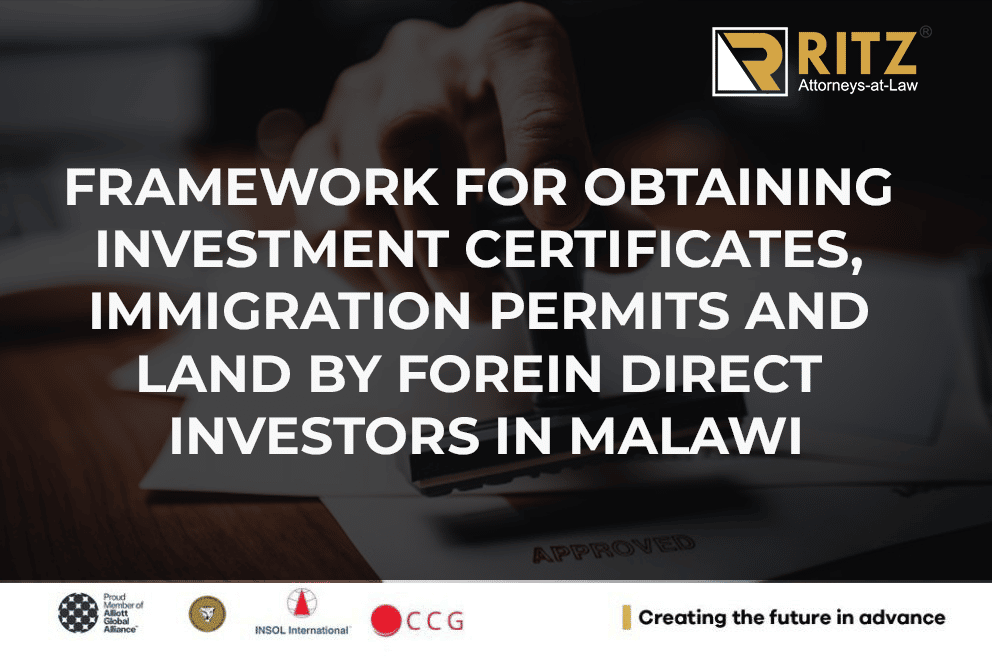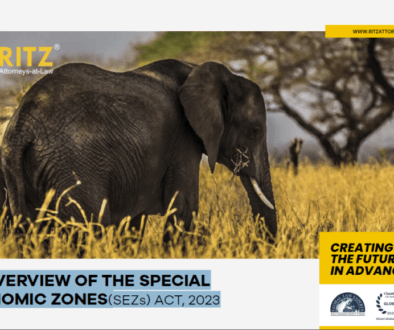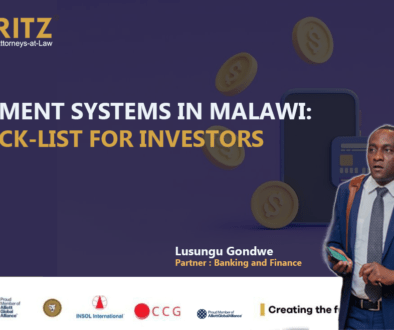FDls and Portfolio Investments in Malawi
Malawi is one of the preferred choices for foreign direct investment. A foreign direct investment (FOI) is an investment made by a firm, company, or individual in one country into business interests located in another country. Malawi has over fifty FOI companies from the USA, UK, Japan, China, RSA, and Germany amongst others in the main sectors of the economy. These companies operate mainly in the manufacturing and processing sector, agriculture, tourism, mining, property development, Financial and Professional Services as well as Transport and Communication. Aside FDls, Malawi also has portfolio investments in which foreign entities purchased equities in Companies in Malawi. In the World Bank’s 2020 Doing Business Report Malawi, Malawi has been ranked 109th worldwide, for the ease of doing business. This represents a slight improvement from the 2019 edition when the country was ranked 111th. This discussion will consider the framework for obtaining investment certificates, immigration permits, and land by FDls in Malawi. The discussion will also outline some other relevant laws that Investors have to be conversant with among many others.
Non-Discriminatory Treatment of FDls
For starters, the Republican Constitution protects investments irrespective of nationality. The Constitution guarantees basic freedom to invest and to own property. Foreign investments and investors are generally granted the same treatment as local investments. The government encourages both domestic and foreign investment in all sectors of the economy. Malawi’s legal system, which is based on the English common law, protects investment regardless of ownership. However, the establishment of investments in the country involves processes that include obtaining a business license, certificate of incorporation, tax registration number, investment certificate, land permits, and immigration permits for personnel. As such, FDls need to be registered with the Malawi Investment Trade Centre.
The roles of the Malawi Investment & Trade Centre
Speaking about the Malawi Investment & Trade Centre [MITC] is the regulatory authority and/or company responsible for certifying investors by issuing Investment Certificates. It was established by the Investment and Promotion Act, of 2012. It is a merger of the Malawi Investment Promotion Agency [MIPA] and the Malawi Export Promotion Council [MEPC]. MITC is also in charge of investment and trade promotion, investor assistance, and advice to the Malawi Government on investment and trade matters. It hosts representatives of the Registrar General, the Malawi Revenue Authority, the Department of Immigration, and the Ministry of Lands, Housing, and Urban Development.
MITC operates as a one-stop investment center to investors by providing the following services free of charge
- Provide courtesy services to visiting investors;
- Guide investors through the investment process in Malawi, i.e. assistance with permits, licenses, land acquisition, and various regulatory and legislative requirements ;
- Provide information on investment opportunities in Malawi;
- Identify joint venture partners, market linkages, and business development ;
- Linking investors to the financial institutions and providers of professional and business services.
- Obtaining permits and other business-related registration certificates on behalf of the investors.
Guidelines for the grant of an Investment Certificate
The Investment and Promotion Act, 2012 provides guidelines on the granting and processing of the Investment Certificate as well as the revocation of the same. Foreign investors that invest a minimum amount of US$50,000 are eligible to apply for an Investment Certificate from MITC. With the completed application form, the investors must submit a business proposal with all details of the project including staffing and expatriate staffing, land requirements, certificate of incorporation, etc. The application processing fee is US$200, or it’s equivalent in Malawi Kwacha (MWK). After the reception, MITC conducts a background check on the company, evaluates and approves or rejects the application. Once the license is approved, the investor has to pay US$800. The grant of the Investment Certificate takes a maximum of twenty-one (21) working days from the date of application is made.
Expatriate Workers and Immigration Permits
Foreign investment will also require permits for its expatriate workers under the Immigration Act. In general, there are four different types of permits for expatriate workers: Temporary Residence Permit (TRP), Business Residence Permit (BRP), Temporary Employment Permit (TEP), and Permanent Residence Permit (PRP). The BRP and TEP are especially of importance to foreign investors and are described in more detail.
Temporary Residence Permit
Section 24 of the Immigration Act provides for a TRP. A TRP is issued to visitors and temporary workers who will stay longer than 90 days but not more than 6 months in the country. A person to whom a temporary residence permit is issued in terms of and who is accompanied by his wife and any of his children under the age of eighteen years may be issued with a single permit in respect of himself, his wife, and such children.
Business Residence Permit
An investor investing at least US$50,000 in Malawi is eligible for a Business Residence Permit (BRP). Section 24A of the Immigration Act provides for a BRP. A BRP can be granted to a person who wishes to reside in Malawi for the purpose of carrying on a business, practicing a profession, or engaging in an occupation, for gain, profit, or reward, as a self-employed person or a partner or a proprietor of that business, professional practice or occupation. The BRP applies to spouses and children as well as dependants. The permit is valid for 5 years and is renewable. The application can be submitted to MITC which acts as Secretariat or directly to Immigration. The application has to contain:
- Application forms in duplicate (available at MITC);
- Two passport-size photographs ;
- Project proposal with full details of the investment project;
- Police clearance from the last country of residence;
- Processing fee of
MITC will process the application and present it to the Chief Immigration Officer under the Immigration Act for further action. At approval, the investor has to pay the issuance fee of MK 500,000.
Temporary Employment Permit
The Temporary Employment Permit (TEP) is for expatriate workers employed by a Malawian firm or firms working on Government contracts and who expect to stay for more than 6 months in the country. Section 25 of the Immigration Act provides for a TEP. The permit is valid for up to 2 years and has to be renewed in case an extension beyond that period is required. Any new application shall contain:
- The immigration application forms;
- 2 copies of the curriculum vitae of the applicant ;
- 2 passport-size photos;
- Copies of certificates;
- Organization chart of the company indicating the position in question;
- Processing fee
The application is filed with MITC for processing and presentation to the Immigration Department and the TEP Committee for approval or rejection. An issuance fee of MK 120,000 has to be paid and the TEP will be received from the Chief Immigration Officer.
Permanent Residence Permit
Section 22 of the Immigration Act provides for Permanent Resident Permits. This permit applies to foreigners who have legally stayed in Malawi for not less than 7 years and may wish to take up residence in Malawi. A permanent residence permit shall cease to be valid if the person to whom it was issued has remained outside Malawi for a continuous period of twelve months or more since the date of issue of such permanent residence permit.
Acquisition of Land
Under the Land Act, Investors are at liberty to acquire leasehold interests in land. The period of a lease for foreign investors or nationals is limited to 50 years. Where a foreign investor intends to acquire land through a lease, the requirement is that there must be a publication first, and when no citizen has made an offer for the land, the land/leasehold interest can be transferred.
Other Key Laws to Consider
As a way of wrapping up, it would be important to note that apart from the above, many other legal instruments, national, bilateral, and multilateral treaties apply in the regulation of the activities of foreign direct investments in Malawi as well as portfolio investments or transnational companies. Below are a few on the national framework. An in-depth account shall be done in follow-up articles.
- The Companies Act, 2013 and the Insolvency Act
- The Taxation Act, Customs & Excise Act, VAT Act
- The Trademarks Act of 2018, the Financial Crimes Act, 2017, The Corrupt Practice (Amendment) Act of 2019,
- The Reserve Bank Act of 2018, Banking Act, Financial Services Act
- The Tobacco Industry Act of 2018
- The Mines and Minerals Act of 2018 among others.
- The Arbitration Act
On the international framework, investors must be aware of the benefits of the following treaties and many more that Malawi is also a party to. An occasion to discuss these conventions shall also arise in follow-up articles.
- The Paris Convention for the Protection of Industrial Property
- Convention on the Settlement of Investment Disputes between States and Nationals of other States of 1965.
- Convention Establishing the Multilateral Investment Guarantee Agency of 1985, entered into force on 12 April 1988.
- Marrakesh Agreement Establishing the World Trade Organisation of 15 April 1994.
- Agreement on Trade-Related Investment Measures.
- General Agreement on Trade in Services.
- Agreement on Trade-Related Aspects of Intellectual Property Rights.
- Treaty Establishing the Market for Eastern and Southern Africa (COMESA), 1993.
- Fourth ACP – EEC Convention (Lome IV) of 1989, entered into force on 1st March 1990.
- Charter on a Regime of Multinational Industrial Enterprises (miles) in the Preferential Trade Area for
- Eastern and Southern African States.
- Southern Africa Development Community (SADC).
- Partnership Agreement between the Members of the African, Caribbean, and Pacific Group of States, of the one part and the European Community and its member states, of the other part, signed in Cotonou,
- Benin on 23 June 2000.
- Province of China 1995, Malaysia 1996.
- Bilateral treaties for the avoidance of double taxation: Sweden 1954, United Kingdom 1955, Denmark 1959, France 1963, Norway 1963, Switzerland 1965, Netherlands 1969, South Africa 1971.
Conclusion
Malawi has developed an investor-friendly legal and business climate. MITC as a one-stop investment center has to be utilized fully by FDls and any other Investor. There is efficiency in the arrangement of obtaining investment certificates and immigration permits. There is absolute promotion and protection of investments regardless of nationality. Acquiring a real property is not onerous. There are incentives for FOI, portfolio investors, and any other investments considering the laws and treaties to facilitate trade and investments among nations.
Notable Authorities:
Data from United Nations Commission for Trade and Development (UNCTAD)
:https://unctad.org/Sections/dite_fdistat/docs/wid_cp_mw_en.pdf https://www.investopedia.com/terms/f/fdi.asp https://www.ceicdata.com/en/indicator/malawi/foreign-direct-investment https://mitc.mw/invest/index.php/investment-climate/fdi-malawi# https://www.state.gov/reports/2019-investment-climate-statements/malawi/ https://www.lloydsbanktrade.com/en/market-potential/malawi/investment https://import-export.societegenerale.fr/en/country/malawi/investment-country-risk
https://public-preview-server. prod.cstreetsa ndbox.com/reports/2019-investment-climate-statements/malawi/ https://www.ceicdata.com/en/indicator/malawi/foreign-direct-investment




